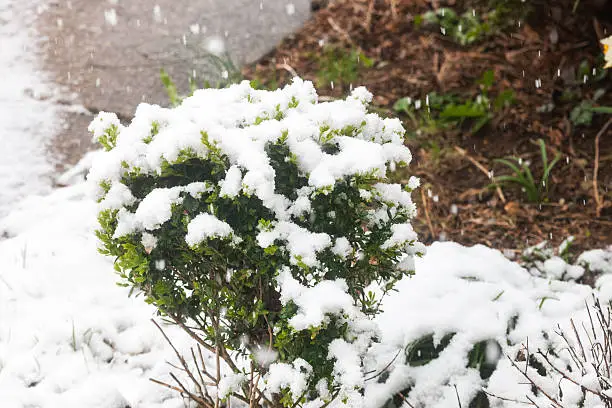Will heavy snow kill my plants? This common concern arises as winter blankets the landscape, particularly in regions like Milwaukee, where heavy snowfall is expected. Understanding the impact of heavy snow on your plants is crucial for ensuring their well-being during the cold months. Contrary to the worry that heavy snow might harm your beloved greens, it’s essential to recognize that snow can benefit your garden.
As we delve into the advantages of snow and share valuable winter landscaping tips, you’ll discover that with thoughtful care, your plants can endure and thrive in the winter wonderland.

The Benefits of Snow for Plants
1. Insulation
Heavy snow is a natural plant insulator, providing a protective layer against harsh winter temperatures. This layer of snow helps regulate the soil temperature, preventing it from fluctuating too dramatically. Just as a cozy blanket keeps you warm during winter nights, the snow shields your plants’ roots from extreme cold, reducing the risk of frost damage.
This insulation is particularly advantageous for recently planted seeds, such as grass. For instance, the impact of snow on newly sown grass seeds can be favorable, safeguarding them from extreme cold and allowing them to remain dormant until favorable conditions for germination arise. When temperatures rise and sunlight returns, the melting snow provides a vital water source, initiating the spring growing season for the plants.
2. Prevent Soil Erosion
But will heavy snow kill my plants by seeping through the soil? Surprisingly, it is completely the opposite. Beyond insulation, heavy snow plays a vital role in preventing soil erosion. When the ground is covered by thick snow, it acts as a barrier against wind and water erosion. This protection is essential for plants’ root systems, helping maintain soil structure and nutrients.
3. Adaptation to the Environment
Plants are resilient, and heavy snowfall is just another aspect of their natural environment. Younger plants may experience their branches bending under the weight of snow, but this is part of their adaptation process. Over time, they learn to cope with these conditions, developing sturdier branches that can withstand the weight of snow. Nature has equipped plants with mechanisms to adapt and thrive, demonstrating that heavy snow does not necessarily threaten their survival.
Which Plants Do the Best in Snow?

If you’re still concerned with the question, “Will heavy snow in Milwaukee kill my plants?” considering plants better equipped to handle heavy snowfall, like evergreens, is a wise choice. These resilient plants have adapted to winter conditions, evolving features like flexible branches that allow them to shed snow easily. Their needle-like leaves also reduce surface area, preventing excessive snow buildup.
Even though heavy snow can benefit plants, as discussed earlier, compacted snow is a different story. Accumulated snow that becomes dense and compact can threaten plants by suffocating them. To avoid this, periodically brush off the snow from your plants.
Each plant has its tolerance levels when it comes to snow. Understanding the specific needs and characteristics of your plants is essential. Some may thrive in heavy snow, while others may require additional protection. Researching and knowing your plants’ requirements can help you decide how to care for them each season properly.
Milwaukee Winter Landscaping Tips

1. Brush Off the Snow
To maintain a healthy lawn, make it a routine to gently brush off the snow from their branches. Be careful not to make sudden movements that could break the branches. This simple act helps prevent the accumulation of compacted snow, ensuring your plants receive insulation benefits without the risk of suffocation.
2. Use Stakes or Supports
For plants that may struggle under the weight of heavy snow, consider using stakes or supports. These structures provide additional stability, preventing branches from bending or breaking. By offering external support, you can help your plants endure the winter weather and be the first ones to bloom once spring arrives.
3. Add Mulch
Mulching around the base of your plants before the onset of winter can provide an extra layer of insulation. Mulch helps maintain an even soil temperature and keeps moisture, providing a stable environment for your plants. This additional protection can be beneficial for plants that are sensitive to freezing temperatures.
4. Watering
Proper hydration is crucial for plants to withstand winter conditions. Before a predicted winter storm, ensure that your plants are adequately watered. Hydrated plants are more resilient to freezing temperatures, and the moisture in the soil contributes to insulating the plants even more.
5. Cover Plants
Consider covering more delicate plants with burlap or frost cloth during severe snowstorms. This protective layer can shield them from direct exposure to heavy snow and freezing winds. Just like putting on a warm coat during winter, this covering provides an additional barrier that helps your plants endure the harshest weather conditions.
End Note
So, will heavy snow kill my plants? Fortunately, the answer is no. If you opt for resilient plant varieties and incorporate simple winter landscaping tips, your landscape can thrive despite the chilly weather. Remember, nature has equipped plants with remarkable adaptability. With a little care, your garden can emerge even more vibrant when warmer temperatures arrive.
If you have specific concerns about how heavy snow might affect your plants or need professional guidance in winter landscaping, don’t hesitate to contact our Landcrafters team. Remember, taking proactive steps now can lead to a flourishing garden when spring arrives.


